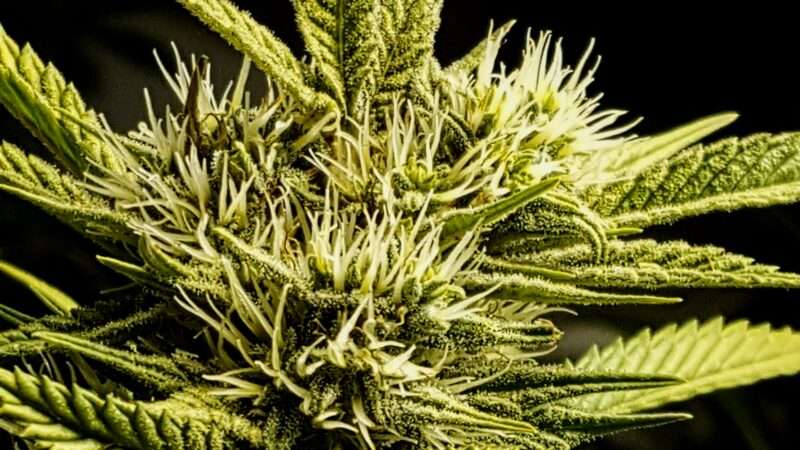
President Joe Biden and many other politicians who continue to resist marijuana legalization instead advocate decriminalization of simple possession. By replacing criminal penalties with civil fines, they argue, legislators can reduce possession arrests without taking the further step of allowing recreational use. But according to a new JAMA Open Network study, states see substantial reductions in marijuana arrests after they legalize recreational use even when they have already decriminalized possession of small amounts.
University of California, San Diego, researchers Christian Gunadi and Yuyan Shi analyzed FBI data on marijuana possession arrests from 2010 to 2019 in 31 states, including nine that legalized recreational use during that period and 22 that did not. Five states in the first group (California, Maine, Massachusetts, Oregon, and Vermont) already had eliminated criminal penalties for low-level possession, while the other four (Alaska, Michigan, Nevada, and Washington) had not.
Compared to states where marijuana remained illegal, arrests fell by 76 percent in the four states that did not decriminalize first. That is not surprising, since in those states adults 21 or older who possess less than a specified amount of marijuana are no longer subject to arrest. The other main result is more striking: In states that had already eliminated criminal penalties for possessing small amounts of marijuana, arrests fell by 40 percent.
That may seem counterintuitive, since low-level marijuana possession was not an arrestable offense in those states even before legalization. But after legalization, Gunadi and Shi note, "law enforcement agents are no longer required to look for cannabis possession violations in a small amount." Although possession in excess of legal limits remains a criminal offense after legalization, they write, "an overall lower police search rate under [recreational legalization] will likely lead to a large reduction in arrests even in states that have already decriminalized cannabis."
That "lower police search rate" is not just a matter of law enforcement priorities. In some states, courts have held that the odor of marijuana, whether detected by a police officer or a drug-sniffing dog, no longer provides probable cause for a search when possession of small amounts has been legalized. In 2017, for example, a Colorado appeals court ruled that an "alert" by a police dog trained to detect marijuana and other drugs does not justify a vehicle search, since it could be triggered by legal possession of cannabis. After New York legalized recreational marijuana last year, the New York Police Department instructed officers that "the smell of marijuana alone no longer establishes probable cause of a crime to search a vehicle."
There is another possible reason why states that legalize marijuana after decriminalizing possession see further declines in arrests: They often increase the amount of marijuana required for an arrest. Even when the maximum amount that can be legally possessed in public is the same as the threshold that triggered criminal charges after decriminalization, states typically set higher limits for private possession.
In California, for example, adults are allowed to grow up to six plants at home and keep the marijuana they produce. Massachusetts allows adults to possess up to 10 ounces at home. In Oregon, the limit is two ounces in public (up from one ounce under decriminalization) and eight ounces at home, but exceeding the latter ceiling does not trigger criminal penalties unless the amount is one pound or more.
Since the minimum age for purchase and possession is 21 in states that allow recreational use, it is not surprising that Gunadi and Shi found "no association between [recreational legalization] and changes in youth arrest rates." They defined "youth" as an arrestee younger than 18, because that is the cutoff used by the FBI, which means it was not possible to look specifically at arrests of 18-to-20-year-olds.
Gunadi and Shi also found that "changes in arrest rates associated with [legalization] did not differ among Black and White individuals." In other words, both groups benefited equally from the reduction in arrests following legalization, which means preexisting disparities would have remained about the same.
"Despite similar rates of cannabis use," Gunadi and Shi note, "Black individuals are reportedly 3 to 4 times more likely to be arrested for cannabis possession compared with White individuals. A previous study estimated that cannabis decriminalization was associated with an approximately 17.0% reduction in racial disparities in arrests among Black and White adults. Our results suggest that [recreational legalization] might not provide additional benefits in terms of reducing racial disparities compared with decriminalization. Nonetheless, we should note that the decrease in cannabis possession arrests after [recreational legalization] was substantial for both Black and White adults, demonstrating an overall change in law enforcement behaviors."
Gunadi and Shi did not consider arrests for public consumption of marijuana, which remains a criminal offense in some states that have legalized recreational use. But their overall findings are consistent with recent national trends, which reflect the impact of legalizing recreational marijuana in a growing number of states (21 so far).
In 2020, according to the FBI's numbers, police in the United States made about 350,000 arrests for marijuana offenses, and nine out of 10 involved possession rather than production or sale. That was the lowest number of marijuana arrests recorded in three decades. The 36 percent drop in 2020 followed an 18 percent decrease in 2019.
The FBI recorded even fewer marijuana arrests last year: about 171,000. But that number should be viewed with caution, because a change in methodology led to substantially lower participation by police departments. The National Organization for the Reform of Marijuana Laws notes that "law enforcement agencies representing some 34 percent of the US population failed to report arrest data in 2021."
The post Even States That Have Already Decriminalized Marijuana Use See Fewer Possession Arrests After Legalization appeared first on Reason.com.







